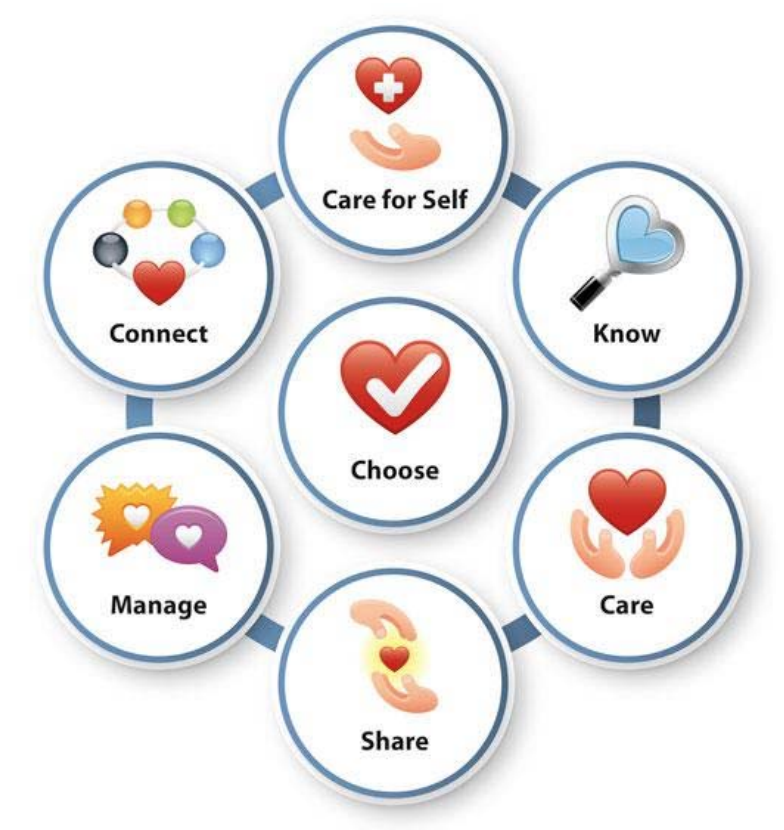Marriage Principles from a National Extension Model

Over the past few decades, marriage and relationship research has improved understanding of what qualities make relationships work. Over a course of 5 years, several Extension state-level faculty developed seven research-based principles that shape healthy relationships. This model is called the National Extension Relationship and Marriage Education Model, or NERMEM.
Through this fact sheet, you will learn about these seven principles—Choose, Care for Self, Know, Care, Share, Manage, and Connect—and how to apply them in your life.
Choose
The first step in creating a healthy marriage is making decisions to create and strengthen healthy relationships. Choose refers to couples making decisions in their relationships and singles making decisions to start relationships

- Being committed to the relationship - Commitment to the relationship includes deciding to enter the relationship. Once making the decision to enter the relationship, you can intentionally grow commitment in your relationship, and increase relationship satisfaction, by scheduling a couple’s retreat, reading books about couple relationships, or seeking counsel.
- Make the relationship a priority - Finding a balance between individual interests and the relationship is also helpful in making your relationship a priority. For example, you could stay home on a Saturday morning to do chores around the house instead of going out with friends.
- Envision a healthy relationship by focusing on strengths. Thinking of your partner’s strengths will create a positive relationship between you and your partner. You can also envision a healthy relationship by discussing a healthy future together. You may do this by talking about going on a vacation together, or making a purchase, such as a washer and dryer or house.
Care for Self
Research has linked physical and mental health with relationship satisfaction. Self-care is a very important part of maintaining a healthy relationship. It will be easier to maintain a healthy relationship if your personal well-being is a priority.
- Physical wellness is important for self-care and relationship satisfaction. Maintaining a healthy diet will decrease your chance of illness and increase your personal and couple well-being. Having nutritious meals as a couple can also be a psychologically supportive ritual, benefiting your relationship. There are many benefits to physical activity, though individuals may find it hard to be physically active due to lack of support from their partner. Some have found exercising with their partner to be motivating and it can help strengthen your body and your relationship.
- Mental and emotional well-being is an important part of relational happiness. Improve your well-being by maintaining a positive perspective. Those who are more positive tend to be more satisfied in their relationships. You can be mindful by noticing the good around you, using emotion regulation skills by reframing the situation, and coping with stress positively to increase your mental and emotional well-being.
- Spiritual wellness - Research has shown couples who have the same spiritual orientation have higher levels of happiness and lower levels of conflict. Spiritual wellness, aside from religious involvement, could also include meditation, reading poetry, prayer, etc.
Know
How well do you really know your partner? How well partners know each other is very important for how satisfied partners will be and how long their relationship will last. It is just as important to know your partner before starting a romantic relationship as it is to continually know your partner throughout the relationship. So, what do partners need to know? The 10 P’s of knowing:
- Personality: What are your partner’s qualities and characteristics?
- Passions: What are their interests? What do they really care about?
- Plans and Priorities: Where do they want to see themselves in the next 10 years?
- Previous Partners: What do you know about your partner’s past relationships and relationship experiences?
- Perspective Taking: How well does your partner see other points of view? Are they empathetic?
- Problem Solving: How do they manage conflict and disagreement?
- Past Family Experiences: Learn about your partner’s family of origin dynamics and interactions.
- Physical/Psychological Health: How is your partner feeling today? Does he/she take care of himself/herself?
- Parenting Experience and Approach: Does your partner want children? What kind of parent would they be?
- Provider Potential: Will your partner be able to help provide for your needs as a couple?
Care
Cultivating positivity through thoughts and actions is one of the important contributors of Care in a relationship. Happy couples participate in cycles of positive, happy interactions, which sets a positive, happy pace for the relationship. You can do this by:
- Noticing and remembering the positivity in your relationship. When good things happen to you and your partner, make a mental note and look back on them. This can include remembering times of smiles and laughter, or displaying a memory on a wall.
- Remembering that problems are temporary and will pass. Holding on to negative views of your partner can lead to dissatisfaction in the relationship, and may even create a negative cycle.
- Having empathy and compassion for your partner will help you understand what it is like to be them. Putting yourself in their shoes will help you care and support them in their time of need.
You can also participate in relationship building behaviors such as:
- Expressing meaningful love by learning how your partner receives love
- Connect to your partner by turning toward them and wanting to connect
- Giving your partner unconditional affection and appreciation
- Making time to talk with your partner about your needs. Show support to your partner by listening to their concerns and being compassionate.
Share
Trust, friendship, and love shared between two people is at the epicenter of a happy couple relationship. Share is about what couples learn together, who they become together, and how they can grow in love together. Friendship is a key characteristic of a strong relationship; Share can help you build one.
- Meaningful quality time is one step to becoming better friends with your partner. Help deepen mutual trust and intimacy by spending time with your spouse. Engaging in common interests and activities will help you be happier. Couples benefit from supporting each other.
- Creating a couple identity can increase your friendship by creating a team mentality, changing from a “me” to a “we” focus. Couples shift from “me” to “we.” Sit down with your spouse and identify your shared values. This will help bind you together and aim the relationship in a common direction, giving the relationship meaning and purpose.
- Positive interactions will build closeness, trust, and resiliency. Talk with each other as partners and learn how to communicate in a supportive way. Supportive communication includes verbal and non-verbal cues. Be an active listener and turn toward your partner. Aim to “think positive” about your partner. When couples focus on the positive interactions, their relationship is nourished and they can better endure hardships.
Manage
Manage covers handling relationship differences in healthy ways. Conflict is a normal part of relationships, and knowing how to handle conflict in healthy ways will help the couple manage stressors effectively.
- Managing negative emotions in conflict is an important part of setting the tone of the discussion. Recognize the signs of negative emotional arousal. Use emotion regulation strategies to decrease negative emotion. Have rules of engagement by setting boundaries when handling conflict. Use repair attempts, which are actions that prevent escalation of conflict. For example, take a “time out” or an actual break from the conflict and return to the situation when negative emotion levels have declined.
- Accepting your partner’s influence often helps with managing conflict. Accepting influence is not about giving in, but it is about respecting your partner and making team decisions. Use empathy to see your partner’s point of view. Put yourself in their shoes to enhance your ability to manage conflict effectively.
- Forgiveness will help you be motivated to respond positively to your partner. When forgiveness is freely granted by the offended, levels of commitment, effective conflict management, and relationship satisfaction increases.
Connect
If couples turn to meaningful connections during challenges, they tend to fare better. The connections we form in life may become a web of support during challenges. It can also offer a different perspective and links in the community can open new opportunities for couples.
- Social support systems can help couples have higher, more stable relationships. Draw support from a community network by nurturing close friendships and developing positive relationships with extended family. There are also community supports available to help with mental health, family counseling, and support groups.
- Connect to sources of meaning by deciding to be actively involved in faith or spiritual communities. Couples who engage in faith or spiritual communities together express they have a common goal and a shared set of beliefs that work to enhance their relationship. If a couple chooses not to engage in spiritual beliefs, it is important to have a shared value system that links you together.
- Reaching out to others benefits couples just as much as supporting each other. Helping others increases self-efficacy, selfesteem, and acts of kindness. Simple acts of service, such as volunteering, or engaging in the community, has positive effects on the couple, providing increased personal meaning, self-worth, and self-control. As partners work together to support others, they will grow closer to each other.
Developing healthy relationship skills is not only important to you, but to children as well. Children learn by example so, by using these healthy relationship tips, you can improve the future relationships of the little ones you care about. For more information regarding the tips, you can visit any of these resources:
References
- Healthy Relationship and Marriage Education Training Project http://www.fcs.uga.edu/docs/HRMET_brochure _GA.pdf
- National Extension Relationship and Marriage Education Network http://www.fcs.uga.edu/docs/NERMEM.pdf
- National Resource Center for Healthy Marriage and Families https://www.healthymarriageandfamilies.org
Authors
Kailee Hansen; David Schramm
Related Research
















